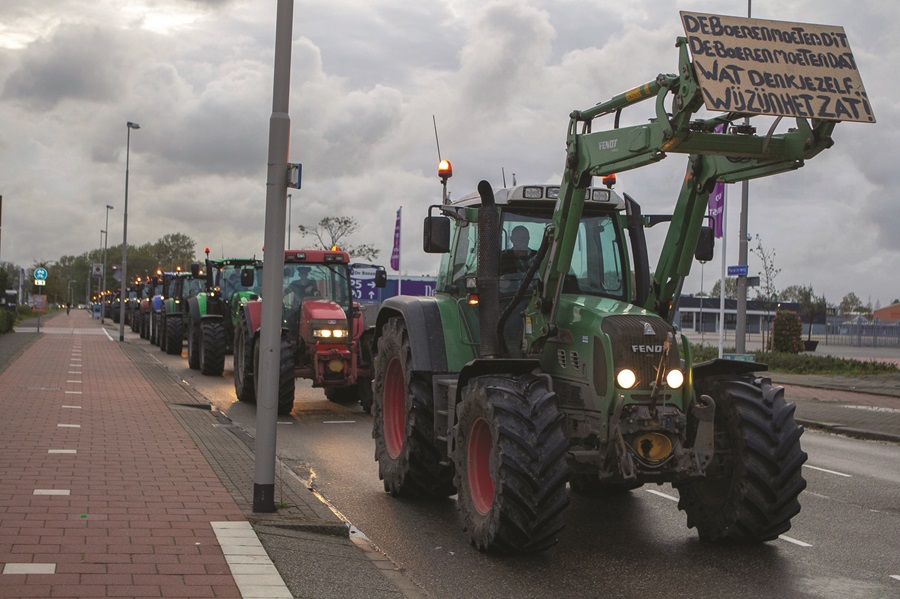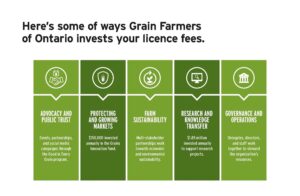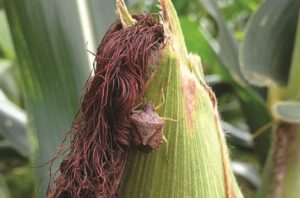Ongoing European farm protests
PRODUCERS CHOKED BY RED TAPE AND ENVIRONMENTAL POLICY

FARMERS ACROSS THE EUROPEAN UNION HAVE BEEN PROTESTING ISSUES driven, for the most part, by failed policy since early 2024. The reasons behind the protests differ from country to country, but most centre around escalating costs, tightening environmental regulations and the rise of cheap imports, particularly from Ukraine. Farmers have staged protests in their respective countries and Brussels, where EU policymakers regularly meet. Their complaints have been heard to some degree. In response, the European Commission extended subsidy allowances by six months until the end of 2024, and the European Council formally adopted a targeted review of the Common Agricultural Policy (CAP) with the goal to cut red tape and ensure simplification for farmers.
FARMER PROTESTS ERUPT ACROSS EUROPE
Although protests have been ongoing in some European countries for years, the main wave of protests that hit countries across the continent this year began in February. Demonstrations of discontent have been driven primarily by low commodity prices, increased trade with non-EU member states, and proposed environmental regulations, including pesticide bans, nitrogen emissions curbs, land and water use restrictions, and carbon taxes.
In a February speech to the European Parliament, Thijs Rompelberg, a Dutch Farmers’ Union LTO board member, explained why Dutch farmers are unhappy with the current policy. He then urged policymakers to consider a new European agricultural and food strategy. This new strategy included five key points.
In his first point, he suggested that Europe adopt a bottom-up approach to limit bureaucracy and over-regulation.
“Farmers and growers want to run their farm,” Rompelberg said. “This should not be done by bureaucrats in an office in Brussels.”
As an example, he pointed to a regulation that forced farmers to plant catch crops by specific fixed dates rather than when it best-suited operations.
“Fixed dates to sow catch crops don’t work in practice,” he said. “The weather determines the sowing and harvesting of crops.”
Rompelberg pointed out the diversity of agriculture in Europe, stating that blanket regulations don’t fit. Farmers need clear targets and tools to reach those targets.
Thirdly, Rompelberg questioned increasing pressure from international trade. Limiting production across the EU means products will have to come from elsewhere, he said. “Our costs are higher than in most countries, so this needs to be part of international trade agreements and the World Trade Organization,” he said, adding that policy- makers should integrate environmental demands into trade deals.
In his speech, Rompelberg also called for the adoption of innovations that could help farmers stay competitive while increasing sustainable production. He called on the European Commission to register RENURE, which is nitrogen recovered from manure, to be used as an inorganic fertilizer replacer.
Finally, Rompelberg expressed concern over the future of agriculture in Europe, a sector he said the Commission should view as a strategic asset that requires protection. He said his concern extended to the younger generation, which lacks prospects to enter the sector.
“We need outcome-based measures, we don’t need rules-based measures,” he said. “We need lawmakers to work with farmers and growers to grow confidence and make the transition.”
RISE OF CHEAP IMPORTS
While eastern European farmers have also expressed frustration with tightening environmental regulations and increased red tape, the bulk of their complaints are focused on unfair competition, particularly from Ukraine. Following Russia’s invasion of Ukraine, the EU waived quotas and duties on agricultural imports. While the move was meant to support Ukraine in a time of political unrest, it led to an influx of grain that flooded markets in the regions closest to the Ukraine border and destabilized local prices.
Renewed discussions to finalize the EU-Mercosur trade deal further fuelled discontent. EU producers say the deal will allow for the introduction of cheaper agricultural products of inferior quality. They’re worried that importing countries won’t have to meet the same stringent environmental and animal welfare standards that they have to meet. They’re also worried consumers will choose products based on price, not quality, especially as mounting inflation pushes food costs to all-time highs.
Their disapproval became clear when Polish farmers blocked borders to disrupt the movement of agricultural products, namely grain. Their efforts were joined by farmers from Hungary, the Czech Republic, and Slovakia.
Throughout the protests, Poland’s Minister of Agriculture and Rural Development, Czesław Siekierski, continued to dialogue with representatives of the farmers’ associations. Siekierski acknowledged that the situation in the grain market has been “extremely difficult.” In late April, the ministry agreed to offer subsidies to grain producers who have been impacted by market destabilization. Subsidies were offered to producers who sold wheat, triticale, rye, barley, and grain mixtures between January 1 and May 31.
In a meeting in mid-May following another Polish farmer protest, Deputy Prime Minister, Minister of National Defense Władysław Kosiniak-Kamysz pointed out that Europe must protect food security and should not accept unequal conditions of competition. “These two issues confirm the need to return to the protection of the European market against the influx of agricultural products from outside the European Union, which are not produced using the requirements of EU farmers,” he said.
Like other European nations, Polish farmers have also protested greenhouse emissions regulations and animal welfare laws brought about by the European Green Deal.
In Belgium, the farmer protests that began in January were driven by three main factors, including over-regulation, legal uncertainty, especially around new nature restoration regulations, and low incomes, said Elisabeth Mertens, head of communications for the Flemish farmers union, the Boerenbond.
“Farmers in Belgium had been pretty unhappy for years already,” she said. “There was a feeling that they were not heard by the government at different levels.”
Belgian farmers took to the streets in January when new nitrate legislation took force. The legislation limits farmers’ ability to expand their operations at a time when many see expansion as the only option for keeping their business viable.
Belgian farmers are also concerned about the legal ambiguity that comes with nature restoration laws. Farm businesses are being scrutinized for their impact on the natural habitats surrounding farms. Young farmers have been left particularly disillusioned, as they no longer know if there is a future in agriculture. Over-regulation was another driving factor behind the Belgian farmer protests. Arable farmers, for instance, are required to register which crops they plan to grow before the season starts, as they are subsidized based on what they’ve registered. If they don’t grow what they’ve registered, they risk incurring fines.
Mertens pointed to this growing season as a prime example of why farmers should have that decision-making power. The spring of 2024 has been extremely wet. Fields were so soggy that planting was put off for weeks.
“This year is a really good example,” said Mertens. “It’s too wet. We couldn’t foresee this. A lot has not been planted yet – for example, potatoes.”
“Farmers say, ‘Maybe we will get a fine because what we planted is different from what we registered in advance,’” she added.
“This is not fair because this is something we didn’t have any power over.”
Low income is the third driver behind the farmer protests in Belgium. Like producers in other European nations, Belgian farmers feel threatened by the sheer volume of cheap products that are being or will be imported into the EU.
THE EUROPEAN COMMISSION RESPONDS
By April, European farmers were protesting so regularly and in so many countries that it was difficult to ignore. Policymakers in Brussels had to respond, especially with European Parliament elections just around the corner. Their response was to scale back rules that protect nature, draw up limits on the import of tariff- and quota-free Ukrainian grains, and get rid of new legislation that aimed to limit pesticide use.
In early May, policymakers agreed to extend subsidy allowances by six months until the end of 2024 to support the region’s agricultural sector.
In mid-May, the European Council formally adopted a targeted review of certain basic acts of the CAP. The review, the Council said, came as a direct response to the concerns voiced by farmers in recent months. It also takes into consideration the geopolitical developments of the past two years.
“This targeted review of the common agricultural policy is a concrete result of our efforts to cut red tape and ensure simplification for farmers,” said David Clarinval, Belgian Deputy Prime Minister and Minister for Agriculture. “The adoption comes only two months after the proposal was presented by the Commission. This clearly demonstrates we are delivering on the promises we have made to European farmers.”
The protests, however, continued right up until the European Parliament elections, which took place June 6–9. As the new parliament settles in, it remains to be seen how the change will impact Europe’s farmers, but they remain hopeful.
Melanie Epp is a Canadian farm writer based in Belgium •



























